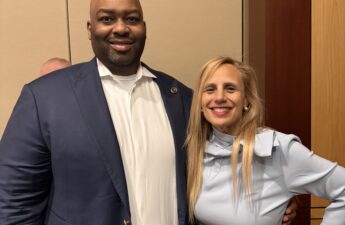By Brad Swanson:
Marcus Simon remembers vividly the feelings of despondency and helplessness he saw around him as reality set in – despite winning 2.9 million more votes than Donald Trump, Hillary Clinton had lost the 2016 presidential election.
“The person who gets the most votes should win,” Simon remembers thinking. “Why shouldn’t it be that simple? That’s the way you elect local legislators, members of Congress, even senators. “
But unlike most of us, Simon had ways to correct a democratic deficit. As a state delegate, whose District 53 includes Falls Church and points west, Simon could introduce legislation to nullify the disproportionate voting power that the archaic Electoral College allocates to some regions. Under this flawed Constitutional provision, minority vote-getters have taken office against the will of the national electorate twice in the 21st century so far. Remember that George W. Bush lost the popular vote against Al Gore by 500,000 ballots in 2000.

Simon was concerned that unrepresentative election results could erode faith in American democracy. “People have to have confidence that the outcome of the election reflects the will of the people,” he said. “When the system is rigged against you, that’s when you start losing confidence. The whole system of government can become unmoored and people start worrying about dictatorship.“
The bill Simon introduced in 2017 was simple, but with far-reaching effects. Under it, Virginia would instruct its electors to cast 100% of their votes for the candidate who won the most votes nationwide. But the measure would only take effect when enough states had adopted a similar one to wield a majority in the Electoral College, including Virginia. From that point, the Electoral College would automatically ratify the outcome of the national popular vote — without having to resort to a cumbersome, lengthy Constitutional amendment process.
The idea was not original. Similar bills – called, collectively, the National Popular Vote Interstate Compact – have been enacted into law in 10 states and Washington D.C., accounting for 165 electoral votes, or 31% of the total.
Simon’s bill died in the Republican-dominated legislature that year, but he introduced it again in the recently concluded 2018 session. Although it met the same fate, he intends to keep raising the topic, although he concedes that it will probably take a Democratic majority in Richmond for it to pass.
Simon acknowledges that our Constitution should not be changed lightly. But he points out that senators originally were elected by state legislatures. The Founders feared “too much democracy – but we have evolved,” he said. As our nation matured, the 17th amendment, which took effect in 1913, mandated direct election of senators. We have never looked back.
What works for the Senate should work for the presidency, Simon believes. But opponents point out that the Senate in fact enshrines a small-state advantage, as each state, no matter how scarce its population, is awarded two seats. This same advantage transfers to the Electoral College, where each state holds seats equivalent to the total of its House and Senate members.
Simon views this as an historical anachronism. “When you had 13 separate entities, to get everyone to move together you had to give concessions. But this argument is not as persuasive in 2018 as it was in 1818. Once the original 13 states came together, over time we created many new political subdivisions. Today I don’t think that the distinctions between small states and large states are as significant. Our interests are not aligned with state borders.”
Simon notes that, “as we have grown up as a country, we have put more faith in the people.” The time has come, he believes, to complete that journey by doing away with a presidential electoral system that does not reflect the will of the people.

Brad Swanson is the editor of The Blue View. He is an international investment manager and previously worked as a diplomat and journalist.


Keep up the good fight. If someday a candidate is elected but loses the popular vote by an even larger margin than Trump the American people will begin to lose faith in their political system. That would be the ultimate tragedy.
Keep bringing it up. The Electoral College is outdated and so one person, one vote along with stopping gerrymandering, will go towards having a more representative legislation.